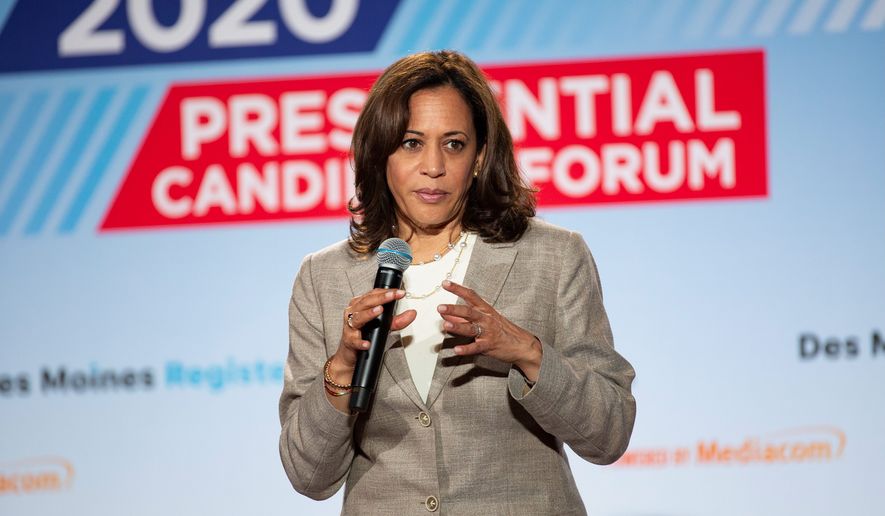OPINION:
Sen. Kamala D. Harris of California was languishing in the Democratic presidential race until she pointed out that former Vice President Joseph R. Biden was a fool for having the same position on school busing that she has. Mr. Biden opposed federally mandated busing to integrate schools in the 1970s — but backed the policy in the case that local jurisdictions authorized it. That is identical to Ms. Harris’s position.
Still, the senator had a “breakout moment” in the Democratic debates a couple of weeks ago when she flayed Mr. Biden on busing. The vice president did not help himself by stammering and palpably struggling in response. Nonetheless, this was a classic case of style over substance. Ms. Harris’s position, literally (to use the vice president’s favorite word) is that Mr. Biden has bad judgment because he agrees with her.
Ms. Harris has been rising in the polls since the debate. After struggling to gain traction for months, she has now risen to second place in New Hampshire, according to a recent poll. She is also now leading in California, her delegate-rich home state that has moved up its primary to earlier in the process this time around. At this stage — and it’s still early — there appear to be four, or perhaps five, bona fide contenders for the Democratic nomination: Mr. Biden, Ms. Harris, Sens. Elizabeth Warren and Bernard Sanders, and, by virtue of his prodigious fundraising, Pete Buttigieg, the mayor of South Bend, Indiana.
Ms. Harris draws inevitable comparisons to the last Democratic president, Barack Obama. Like Mr. Obama, Ms. Harris is of mixed race heritage — in her case, a Jamaican father and an Indian mother. Like Mr. Obama, she was partially raised abroad, in her case in Montreal rather than Indonesia. Both are attorneys, and both are palpably ambitious, tiring of the Senate shortly into their first terms and deciding to run for president.
But beyond that, the comparison doesn’t really hold up. I don’t know Mr. Obama, nor is he a friend of mine. But I can safely say: Kamala Harris is no Barack Obama.
In 2007 and 2008, Mr. Obama ran on a clear platform. He was the only major Democratic candidate to have opposed the Iraq War, and would continue to oppose foreign misadventures. He wanted to expand the government’s involvement in health care. He wanted to pursue aggressive environmental policies. Whether he ended up governing the way he promised to is debatable, but he was consistent during the campaign.
Ms. Harris, by contrast, struggles to identify her own position on issues. When she isn’t attacking other Democrats for agreeing with her, she often flip-flops. Or rather, flip-flop-flip-flops. She has gone back and forth many times on whether her “Medicare for All” plan would bar private health insurance. She backed decriminalizing illegal border crossings and then seemed to backtrack in a subsequent appearance on “The View.” At a candidate forum, she seemed to support letting prisoners vote, only to disown her position swiftly. A liberal columnist for The Week magazine calls it “Kamala Harris’s sincerity problem.”
In 2008, Mr. Obama did not seek to obscure his record. His public statements against the Iraq War, for instance, were on the record in 2003. Ms. Harris, by contrast, seems largely embarrassed by her pre-senatorial career. She was San Francisco district attorney and subsequently California attorney general. By all accounts, she performed solidly in these roles: Tough on crime and serious about public safety. But now Ms. Harris is pretending she was anything but, claiming that, despite her record, she was in fact a “progressive prosecutor.”
Ms. Harris, for instance, wrote a Los Angeles Times op-ed during her Senate run decrying “America’s mass incarceration crisis.” She bemoaned “mandatory minimums for non-violent crimes.” Yet as attorney general, she opposed a ballot measure that would have eliminated mandatory minimums for non-violent crimes.
Law professor Lara Bazelon, writing in The New York Times this year, argued that Ms. Harris was “not a progressive prosecutor.”
“When a federal judge in Orange County ruled that the death penalty was unconstitutional in 2014, Ms. Harris appealed,” Ms. Bazelon wrote. “In 2014, she declined to take a position on Proposition 47, a ballot initiative approved by voters, that reduced certain low-level felonies to misdemeanors. She laughed that year when a reporter asked if she would support the legalization of marijuana for recreational use. Ms. Harris finally reversed course in 2018, long after public opinion had shifted on the topic.”
One last thing. Mr. Obama is a genuinely talented author — “Dreams From My Father” is a terrific work of literature, if audacious (who has the chutzpah to write a memoir at 32 years old?). Ms. Harris’s “The Truths We Hold,” according to National Public Radio, “demonstrates what’s wrong with campaign books.”
• Ethan Epstein is deputy opinion editor of The Washington Times. Contact him at eepstein@washingtontimes.com or on Twitter @ethanepstiiiine.




Please read our comment policy before commenting.